Research Report: Equality and Diversity in the Workplace
VerifiedAdded on 2023/01/09
|27
|6132
|71
Report
AI Summary
This report presents a comprehensive research study on equality and diversity in the workplace, focusing on diversity inclusion and the rights of disabled individuals within the context of Royal Mail UK. The research explores the importance of diversity inclusion, ways to improve it, and the specific rights of disabled individuals in recruitment and selection processes. The report includes a literature review that highlights key themes such as the benefits of diversity, strategies for enhancing inclusion, and legal considerations. The methodology involves a qualitative approach with an inductive research design, and data collection methods that include both primary and secondary data, including a survey of 30 employees. The findings of the research are analysed to provide insights into the current state of diversity inclusion and offers recommendations for promoting the rights of disabled people in recruitment and selection. The report concludes with a reflection on the research process and suggestions for further investigation, making it a valuable resource for understanding and improving workplace diversity practices.
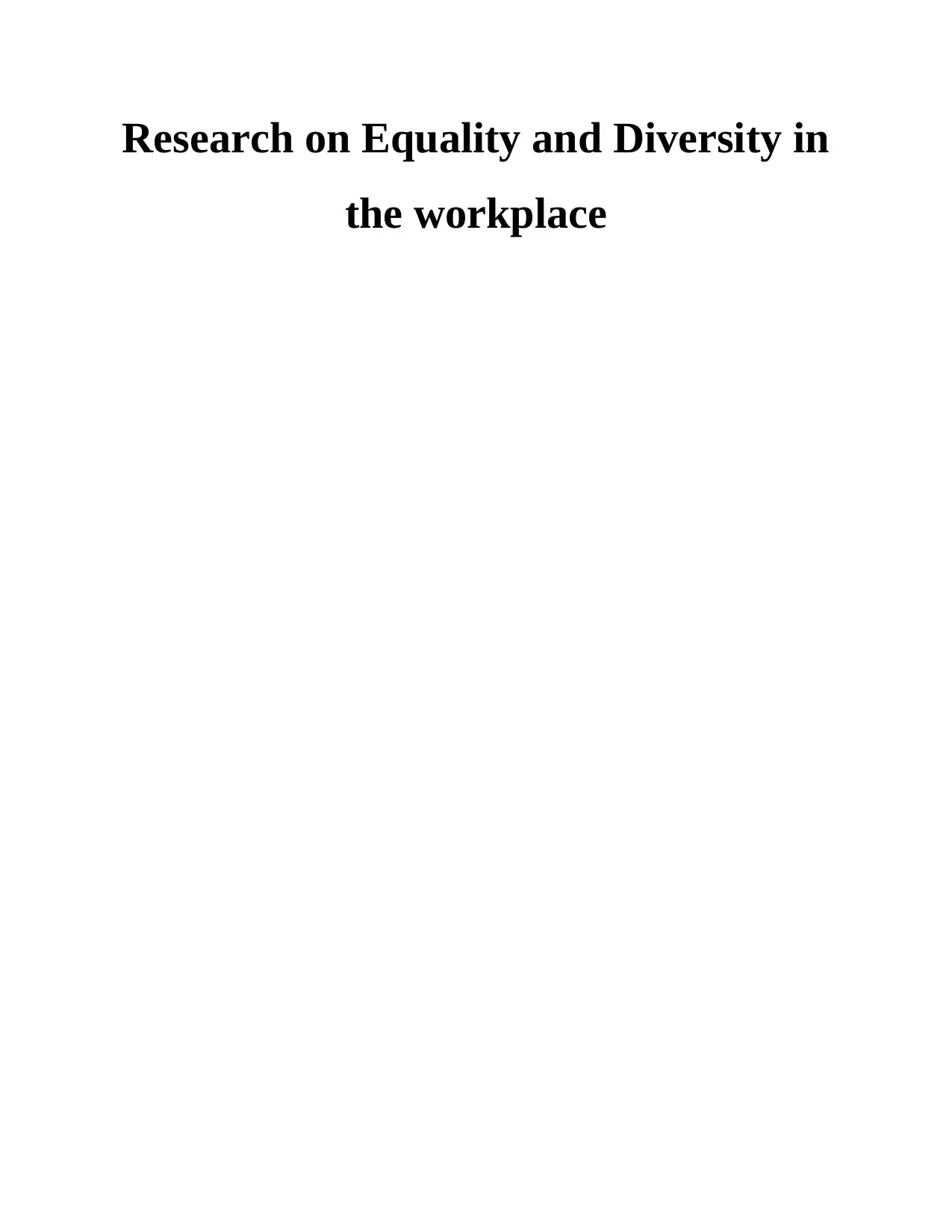
Research on Equality and Diversity in
the workplace
the workplace
Paraphrase This Document
Need a fresh take? Get an instant paraphrase of this document with our AI Paraphraser
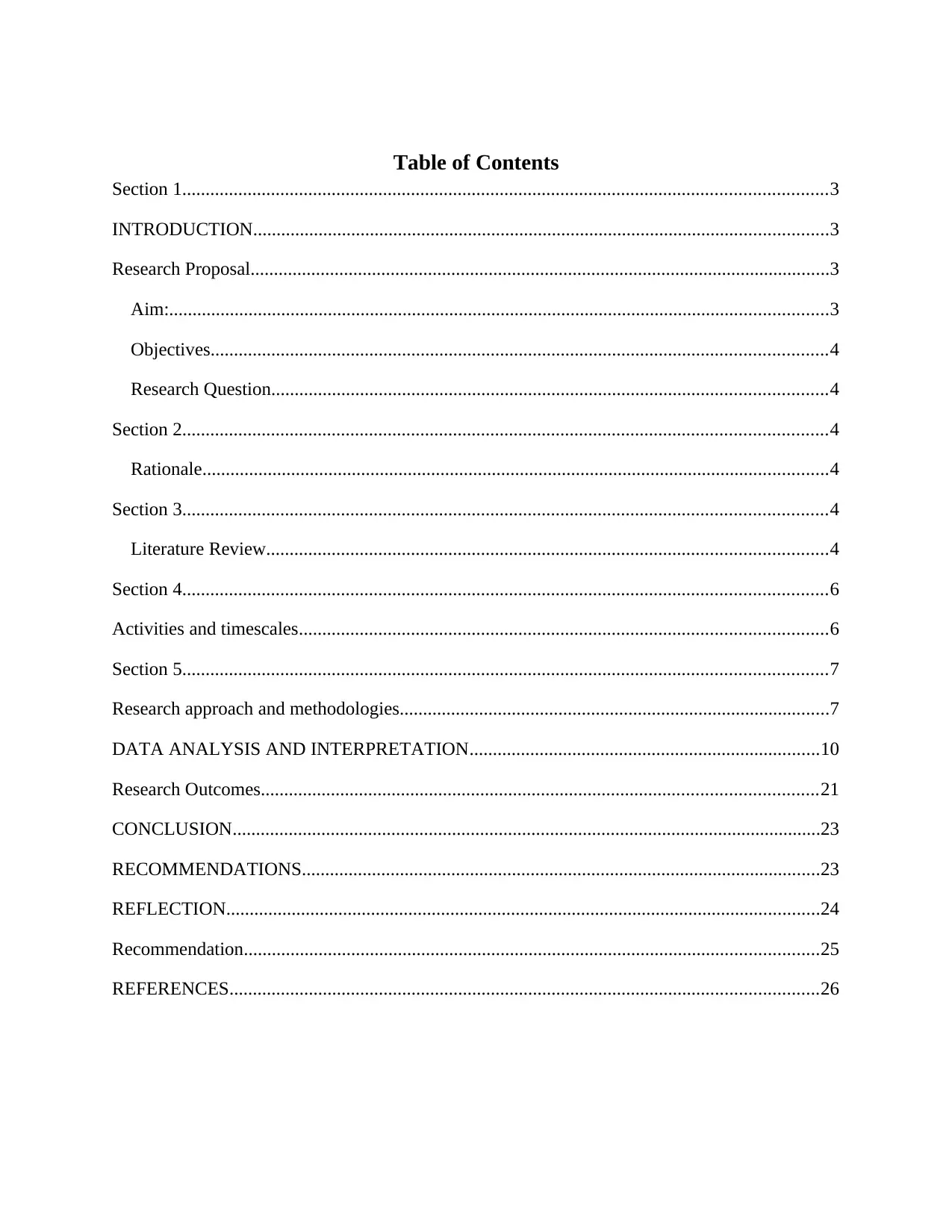
Table of Contents
Section 1..........................................................................................................................................3
INTRODUCTION...........................................................................................................................3
Research Proposal............................................................................................................................3
Aim:.............................................................................................................................................3
Objectives....................................................................................................................................4
Research Question.......................................................................................................................4
Section 2..........................................................................................................................................4
Rationale......................................................................................................................................4
Section 3..........................................................................................................................................4
Literature Review........................................................................................................................4
Section 4..........................................................................................................................................6
Activities and timescales.................................................................................................................6
Section 5..........................................................................................................................................7
Research approach and methodologies............................................................................................7
DATA ANALYSIS AND INTERPRETATION...........................................................................10
Research Outcomes.......................................................................................................................21
CONCLUSION..............................................................................................................................23
RECOMMENDATIONS...............................................................................................................23
REFLECTION...............................................................................................................................24
Recommendation...........................................................................................................................25
REFERENCES..............................................................................................................................26
Section 1..........................................................................................................................................3
INTRODUCTION...........................................................................................................................3
Research Proposal............................................................................................................................3
Aim:.............................................................................................................................................3
Objectives....................................................................................................................................4
Research Question.......................................................................................................................4
Section 2..........................................................................................................................................4
Rationale......................................................................................................................................4
Section 3..........................................................................................................................................4
Literature Review........................................................................................................................4
Section 4..........................................................................................................................................6
Activities and timescales.................................................................................................................6
Section 5..........................................................................................................................................7
Research approach and methodologies............................................................................................7
DATA ANALYSIS AND INTERPRETATION...........................................................................10
Research Outcomes.......................................................................................................................21
CONCLUSION..............................................................................................................................23
RECOMMENDATIONS...............................................................................................................23
REFLECTION...............................................................................................................................24
Recommendation...........................................................................................................................25
REFERENCES..............................................................................................................................26
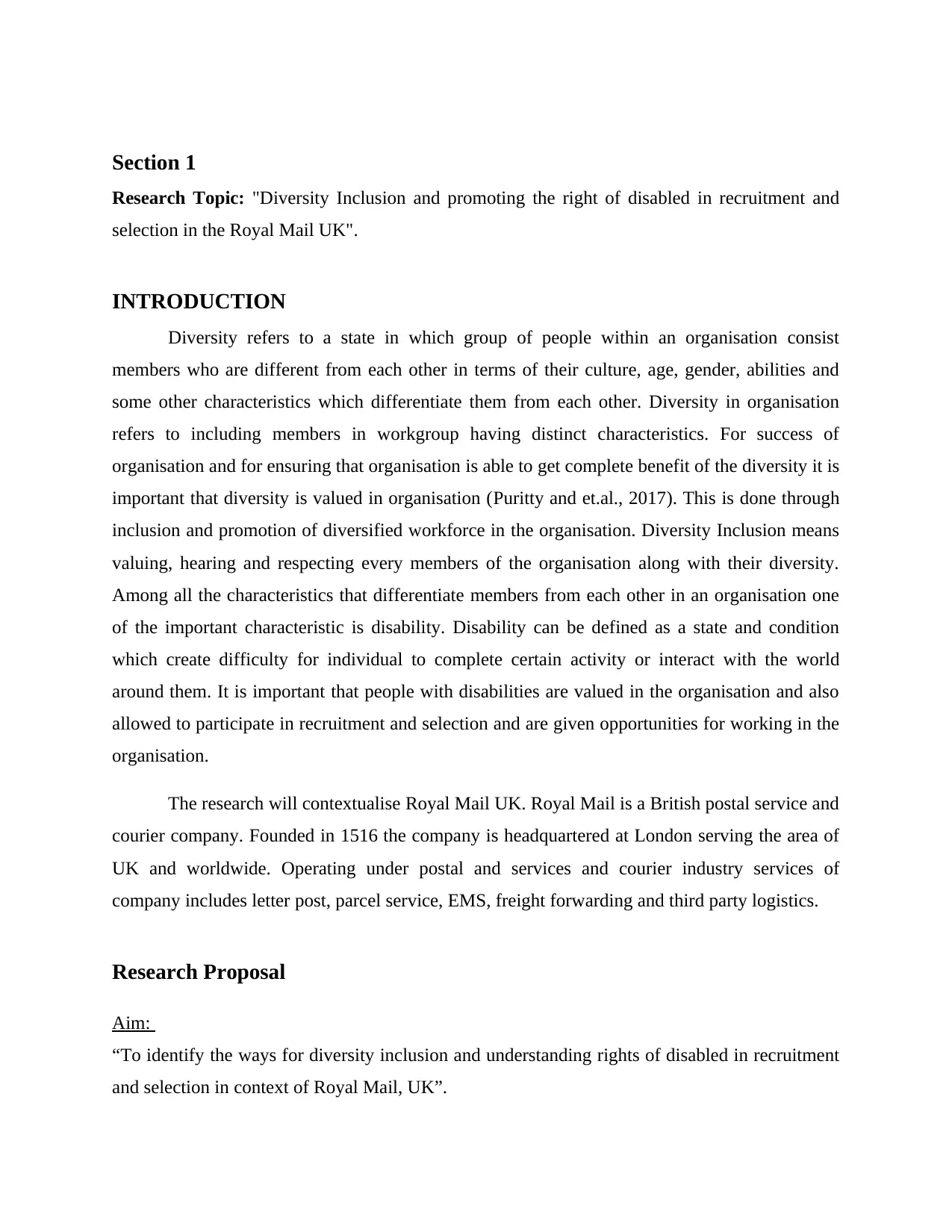
Section 1
Research Topic: "Diversity Inclusion and promoting the right of disabled in recruitment and
selection in the Royal Mail UK".
INTRODUCTION
Diversity refers to a state in which group of people within an organisation consist
members who are different from each other in terms of their culture, age, gender, abilities and
some other characteristics which differentiate them from each other. Diversity in organisation
refers to including members in workgroup having distinct characteristics. For success of
organisation and for ensuring that organisation is able to get complete benefit of the diversity it is
important that diversity is valued in organisation (Puritty and et.al., 2017). This is done through
inclusion and promotion of diversified workforce in the organisation. Diversity Inclusion means
valuing, hearing and respecting every members of the organisation along with their diversity.
Among all the characteristics that differentiate members from each other in an organisation one
of the important characteristic is disability. Disability can be defined as a state and condition
which create difficulty for individual to complete certain activity or interact with the world
around them. It is important that people with disabilities are valued in the organisation and also
allowed to participate in recruitment and selection and are given opportunities for working in the
organisation.
The research will contextualise Royal Mail UK. Royal Mail is a British postal service and
courier company. Founded in 1516 the company is headquartered at London serving the area of
UK and worldwide. Operating under postal and services and courier industry services of
company includes letter post, parcel service, EMS, freight forwarding and third party logistics.
Research Proposal
Aim:
“To identify the ways for diversity inclusion and understanding rights of disabled in recruitment
and selection in context of Royal Mail, UK”.
Research Topic: "Diversity Inclusion and promoting the right of disabled in recruitment and
selection in the Royal Mail UK".
INTRODUCTION
Diversity refers to a state in which group of people within an organisation consist
members who are different from each other in terms of their culture, age, gender, abilities and
some other characteristics which differentiate them from each other. Diversity in organisation
refers to including members in workgroup having distinct characteristics. For success of
organisation and for ensuring that organisation is able to get complete benefit of the diversity it is
important that diversity is valued in organisation (Puritty and et.al., 2017). This is done through
inclusion and promotion of diversified workforce in the organisation. Diversity Inclusion means
valuing, hearing and respecting every members of the organisation along with their diversity.
Among all the characteristics that differentiate members from each other in an organisation one
of the important characteristic is disability. Disability can be defined as a state and condition
which create difficulty for individual to complete certain activity or interact with the world
around them. It is important that people with disabilities are valued in the organisation and also
allowed to participate in recruitment and selection and are given opportunities for working in the
organisation.
The research will contextualise Royal Mail UK. Royal Mail is a British postal service and
courier company. Founded in 1516 the company is headquartered at London serving the area of
UK and worldwide. Operating under postal and services and courier industry services of
company includes letter post, parcel service, EMS, freight forwarding and third party logistics.
Research Proposal
Aim:
“To identify the ways for diversity inclusion and understanding rights of disabled in recruitment
and selection in context of Royal Mail, UK”.
⊘ This is a preview!⊘
Do you want full access?
Subscribe today to unlock all pages.

Trusted by 1+ million students worldwide
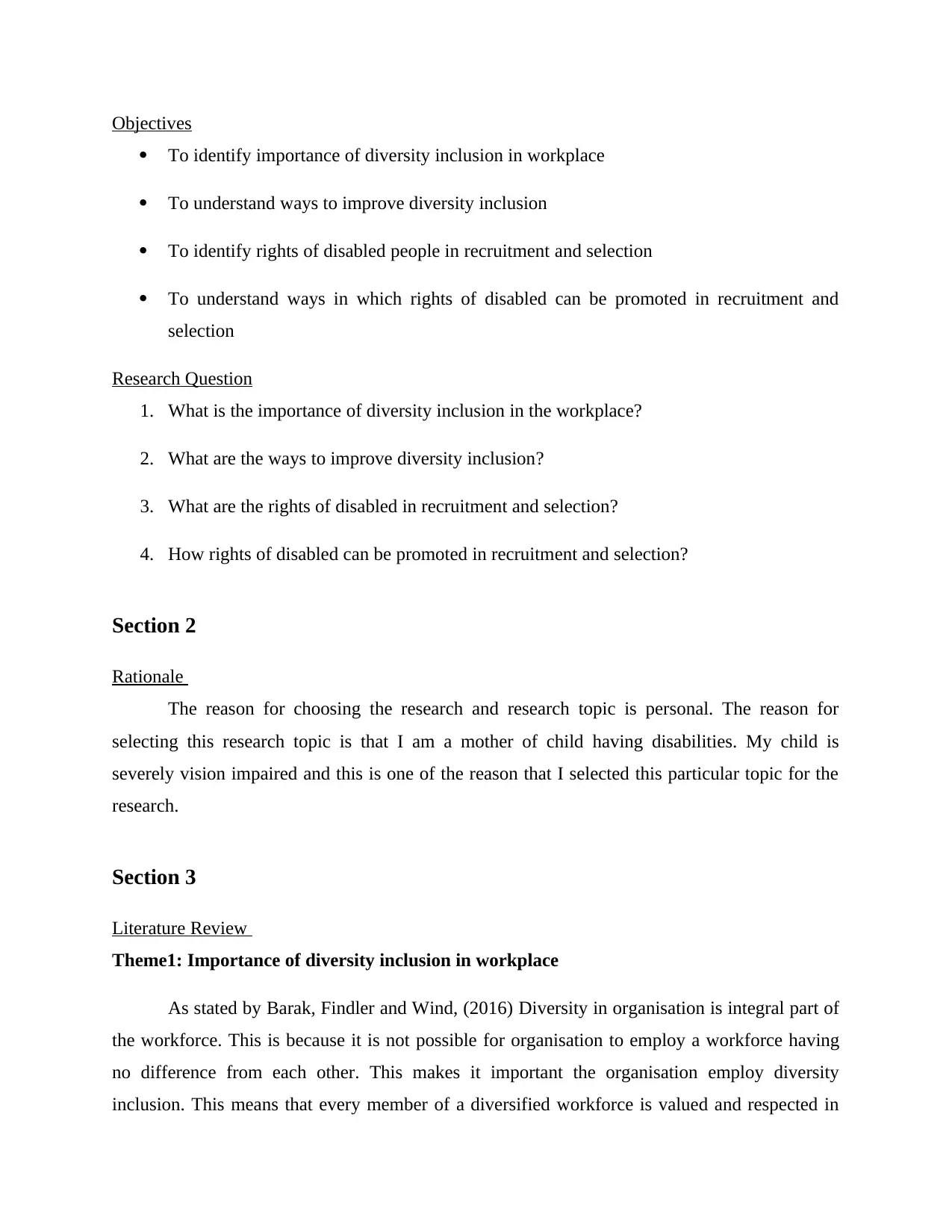
Objectives
To identify importance of diversity inclusion in workplace
To understand ways to improve diversity inclusion
To identify rights of disabled people in recruitment and selection
To understand ways in which rights of disabled can be promoted in recruitment and
selection
Research Question
1. What is the importance of diversity inclusion in the workplace?
2. What are the ways to improve diversity inclusion?
3. What are the rights of disabled in recruitment and selection?
4. How rights of disabled can be promoted in recruitment and selection?
Section 2
Rationale
The reason for choosing the research and research topic is personal. The reason for
selecting this research topic is that I am a mother of child having disabilities. My child is
severely vision impaired and this is one of the reason that I selected this particular topic for the
research.
Section 3
Literature Review
Theme1: Importance of diversity inclusion in workplace
As stated by Barak, Findler and Wind, (2016) Diversity in organisation is integral part of
the workforce. This is because it is not possible for organisation to employ a workforce having
no difference from each other. This makes it important the organisation employ diversity
inclusion. This means that every member of a diversified workforce is valued and respected in
To identify importance of diversity inclusion in workplace
To understand ways to improve diversity inclusion
To identify rights of disabled people in recruitment and selection
To understand ways in which rights of disabled can be promoted in recruitment and
selection
Research Question
1. What is the importance of diversity inclusion in the workplace?
2. What are the ways to improve diversity inclusion?
3. What are the rights of disabled in recruitment and selection?
4. How rights of disabled can be promoted in recruitment and selection?
Section 2
Rationale
The reason for choosing the research and research topic is personal. The reason for
selecting this research topic is that I am a mother of child having disabilities. My child is
severely vision impaired and this is one of the reason that I selected this particular topic for the
research.
Section 3
Literature Review
Theme1: Importance of diversity inclusion in workplace
As stated by Barak, Findler and Wind, (2016) Diversity in organisation is integral part of
the workforce. This is because it is not possible for organisation to employ a workforce having
no difference from each other. This makes it important the organisation employ diversity
inclusion. This means that every member of a diversified workforce is valued and respected in
Paraphrase This Document
Need a fresh take? Get an instant paraphrase of this document with our AI Paraphraser
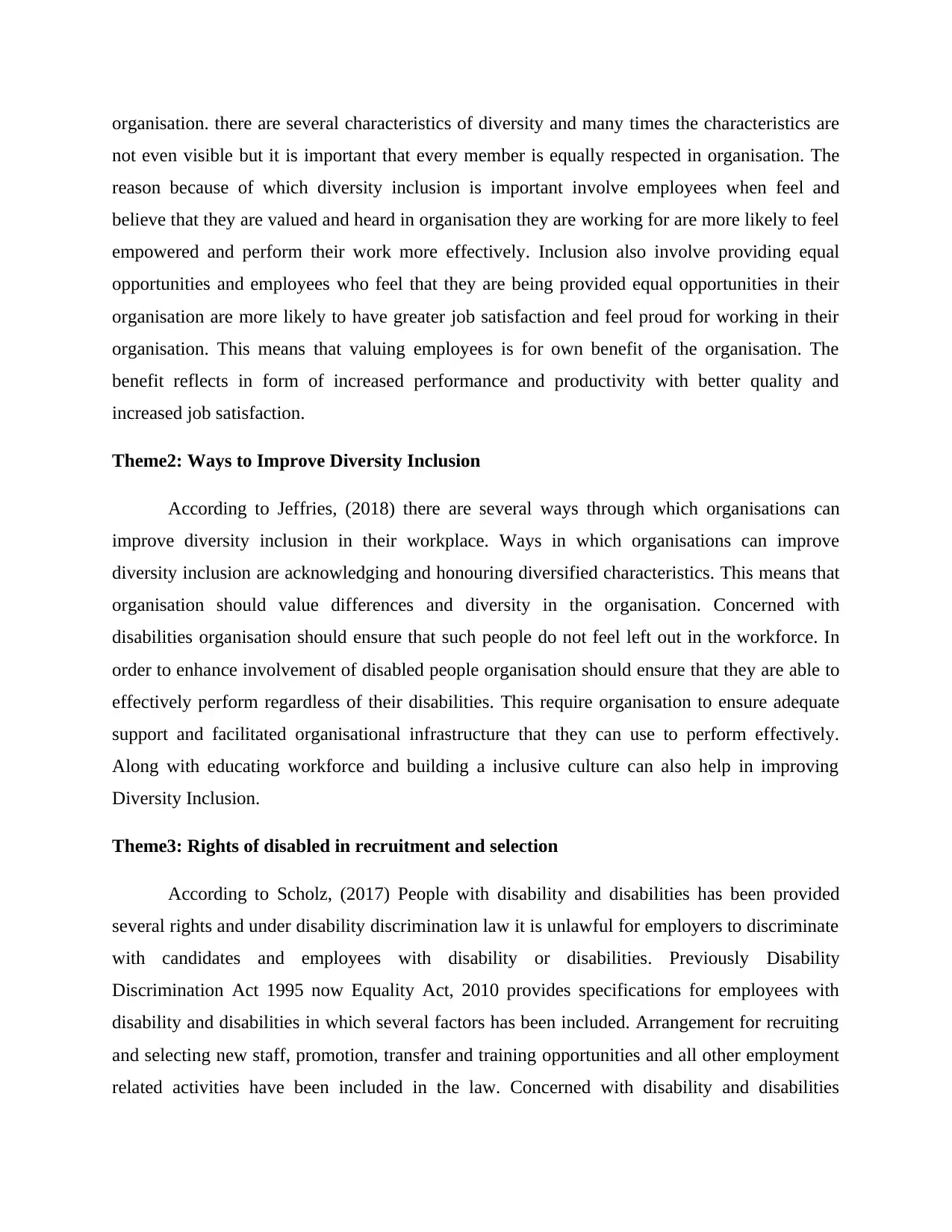
organisation. there are several characteristics of diversity and many times the characteristics are
not even visible but it is important that every member is equally respected in organisation. The
reason because of which diversity inclusion is important involve employees when feel and
believe that they are valued and heard in organisation they are working for are more likely to feel
empowered and perform their work more effectively. Inclusion also involve providing equal
opportunities and employees who feel that they are being provided equal opportunities in their
organisation are more likely to have greater job satisfaction and feel proud for working in their
organisation. This means that valuing employees is for own benefit of the organisation. The
benefit reflects in form of increased performance and productivity with better quality and
increased job satisfaction.
Theme2: Ways to Improve Diversity Inclusion
According to Jeffries, (2018) there are several ways through which organisations can
improve diversity inclusion in their workplace. Ways in which organisations can improve
diversity inclusion are acknowledging and honouring diversified characteristics. This means that
organisation should value differences and diversity in the organisation. Concerned with
disabilities organisation should ensure that such people do not feel left out in the workforce. In
order to enhance involvement of disabled people organisation should ensure that they are able to
effectively perform regardless of their disabilities. This require organisation to ensure adequate
support and facilitated organisational infrastructure that they can use to perform effectively.
Along with educating workforce and building a inclusive culture can also help in improving
Diversity Inclusion.
Theme3: Rights of disabled in recruitment and selection
According to Scholz, (2017) People with disability and disabilities has been provided
several rights and under disability discrimination law it is unlawful for employers to discriminate
with candidates and employees with disability or disabilities. Previously Disability
Discrimination Act 1995 now Equality Act, 2010 provides specifications for employees with
disability and disabilities in which several factors has been included. Arrangement for recruiting
and selecting new staff, promotion, transfer and training opportunities and all other employment
related activities have been included in the law. Concerned with disability and disabilities
not even visible but it is important that every member is equally respected in organisation. The
reason because of which diversity inclusion is important involve employees when feel and
believe that they are valued and heard in organisation they are working for are more likely to feel
empowered and perform their work more effectively. Inclusion also involve providing equal
opportunities and employees who feel that they are being provided equal opportunities in their
organisation are more likely to have greater job satisfaction and feel proud for working in their
organisation. This means that valuing employees is for own benefit of the organisation. The
benefit reflects in form of increased performance and productivity with better quality and
increased job satisfaction.
Theme2: Ways to Improve Diversity Inclusion
According to Jeffries, (2018) there are several ways through which organisations can
improve diversity inclusion in their workplace. Ways in which organisations can improve
diversity inclusion are acknowledging and honouring diversified characteristics. This means that
organisation should value differences and diversity in the organisation. Concerned with
disabilities organisation should ensure that such people do not feel left out in the workforce. In
order to enhance involvement of disabled people organisation should ensure that they are able to
effectively perform regardless of their disabilities. This require organisation to ensure adequate
support and facilitated organisational infrastructure that they can use to perform effectively.
Along with educating workforce and building a inclusive culture can also help in improving
Diversity Inclusion.
Theme3: Rights of disabled in recruitment and selection
According to Scholz, (2017) People with disability and disabilities has been provided
several rights and under disability discrimination law it is unlawful for employers to discriminate
with candidates and employees with disability or disabilities. Previously Disability
Discrimination Act 1995 now Equality Act, 2010 provides specifications for employees with
disability and disabilities in which several factors has been included. Arrangement for recruiting
and selecting new staff, promotion, transfer and training opportunities and all other employment
related activities have been included in the law. Concerned with disability and disabilities
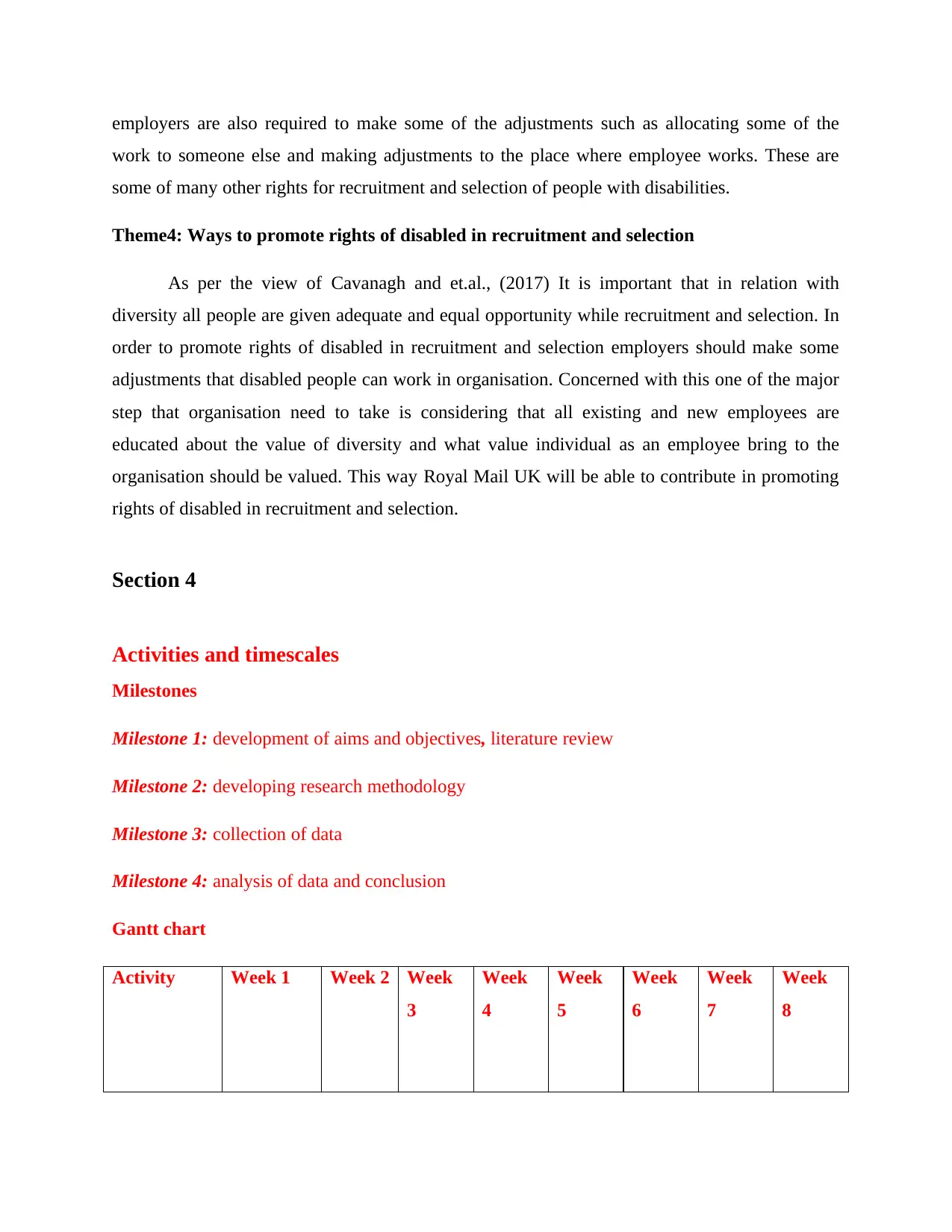
employers are also required to make some of the adjustments such as allocating some of the
work to someone else and making adjustments to the place where employee works. These are
some of many other rights for recruitment and selection of people with disabilities.
Theme4: Ways to promote rights of disabled in recruitment and selection
As per the view of Cavanagh and et.al., (2017) It is important that in relation with
diversity all people are given adequate and equal opportunity while recruitment and selection. In
order to promote rights of disabled in recruitment and selection employers should make some
adjustments that disabled people can work in organisation. Concerned with this one of the major
step that organisation need to take is considering that all existing and new employees are
educated about the value of diversity and what value individual as an employee bring to the
organisation should be valued. This way Royal Mail UK will be able to contribute in promoting
rights of disabled in recruitment and selection.
Section 4
Activities and timescales
Milestones
Milestone 1: development of aims and objectives, literature review
Milestone 2: developing research methodology
Milestone 3: collection of data
Milestone 4: analysis of data and conclusion
Gantt chart
Activity Week 1 Week 2 Week
3
Week
4
Week
5
Week
6
Week
7
Week
8
work to someone else and making adjustments to the place where employee works. These are
some of many other rights for recruitment and selection of people with disabilities.
Theme4: Ways to promote rights of disabled in recruitment and selection
As per the view of Cavanagh and et.al., (2017) It is important that in relation with
diversity all people are given adequate and equal opportunity while recruitment and selection. In
order to promote rights of disabled in recruitment and selection employers should make some
adjustments that disabled people can work in organisation. Concerned with this one of the major
step that organisation need to take is considering that all existing and new employees are
educated about the value of diversity and what value individual as an employee bring to the
organisation should be valued. This way Royal Mail UK will be able to contribute in promoting
rights of disabled in recruitment and selection.
Section 4
Activities and timescales
Milestones
Milestone 1: development of aims and objectives, literature review
Milestone 2: developing research methodology
Milestone 3: collection of data
Milestone 4: analysis of data and conclusion
Gantt chart
Activity Week 1 Week 2 Week
3
Week
4
Week
5
Week
6
Week
7
Week
8
⊘ This is a preview!⊘
Do you want full access?
Subscribe today to unlock all pages.

Trusted by 1+ million students worldwide
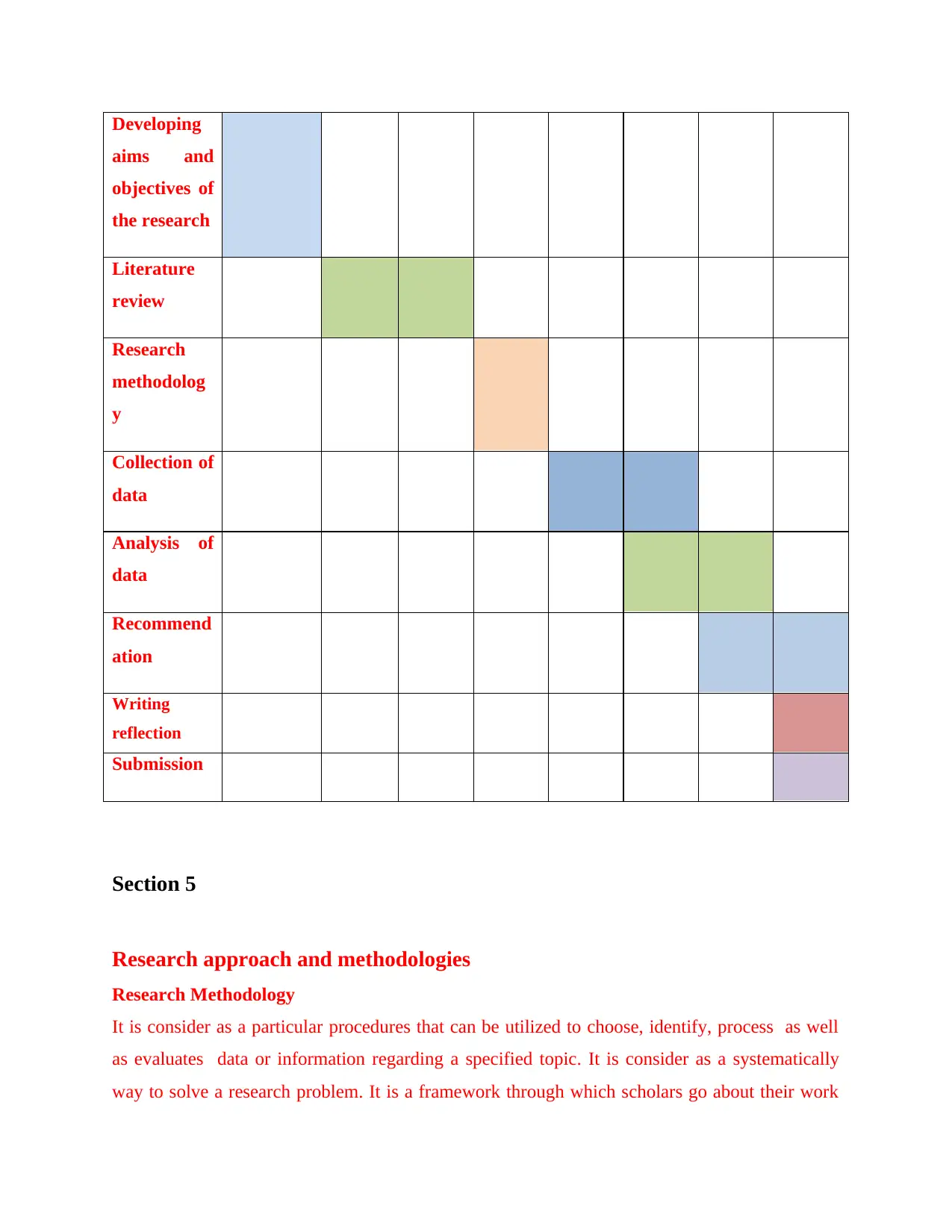
Developing
aims and
objectives of
the research
Literature
review
Research
methodolog
y
Collection of
data
Analysis of
data
Recommend
ation
Writing
reflection
Submission
Section 5
Research approach and methodologies
Research Methodology
It is consider as a particular procedures that can be utilized to choose, identify, process as well
as evaluates data or information regarding a specified topic. It is consider as a systematically
way to solve a research problem. It is a framework through which scholars go about their work
aims and
objectives of
the research
Literature
review
Research
methodolog
y
Collection of
data
Analysis of
data
Recommend
ation
Writing
reflection
Submission
Section 5
Research approach and methodologies
Research Methodology
It is consider as a particular procedures that can be utilized to choose, identify, process as well
as evaluates data or information regarding a specified topic. It is consider as a systematically
way to solve a research problem. It is a framework through which scholars go about their work
Paraphrase This Document
Need a fresh take? Get an instant paraphrase of this document with our AI Paraphraser
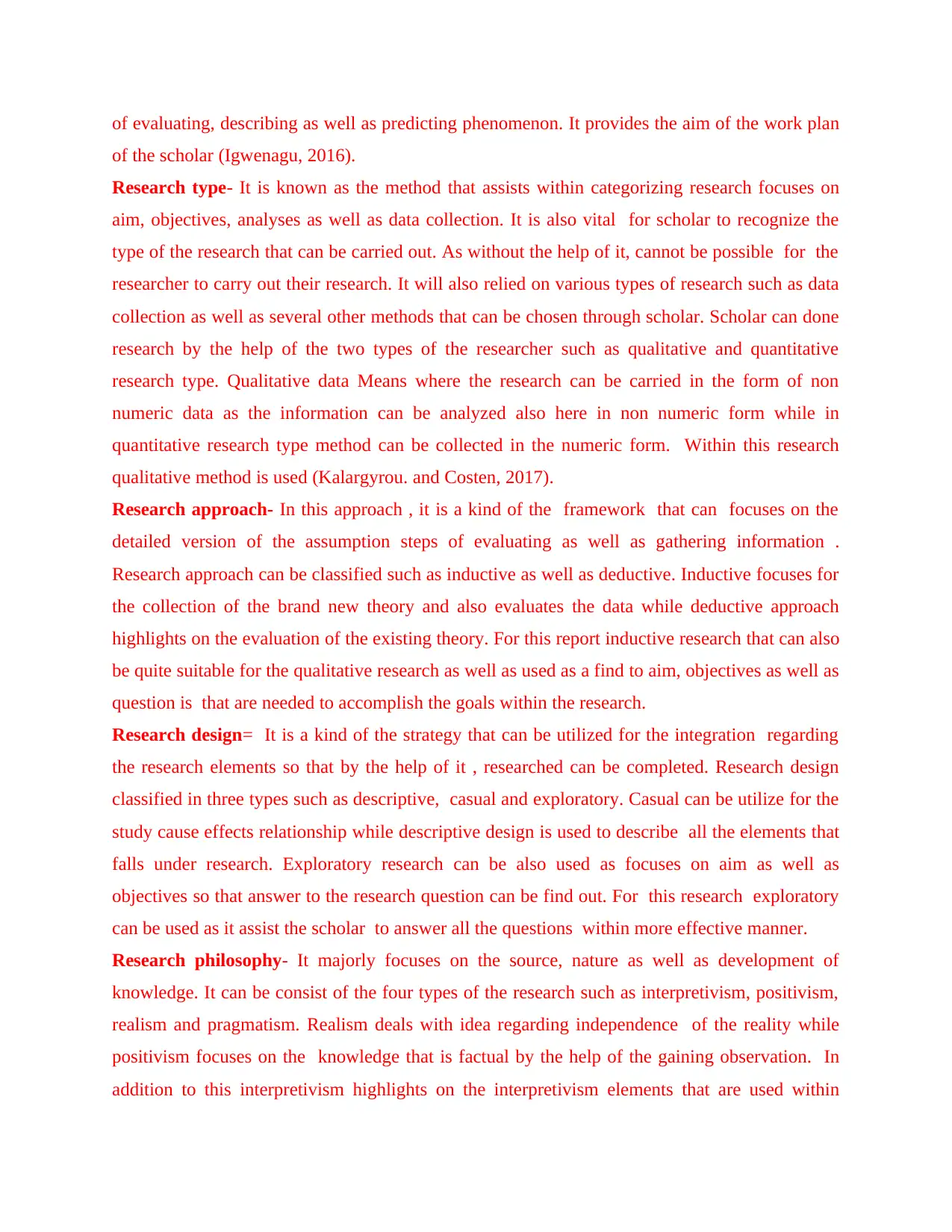
of evaluating, describing as well as predicting phenomenon. It provides the aim of the work plan
of the scholar (Igwenagu, 2016).
Research type- It is known as the method that assists within categorizing research focuses on
aim, objectives, analyses as well as data collection. It is also vital for scholar to recognize the
type of the research that can be carried out. As without the help of it, cannot be possible for the
researcher to carry out their research. It will also relied on various types of research such as data
collection as well as several other methods that can be chosen through scholar. Scholar can done
research by the help of the two types of the researcher such as qualitative and quantitative
research type. Qualitative data Means where the research can be carried in the form of non
numeric data as the information can be analyzed also here in non numeric form while in
quantitative research type method can be collected in the numeric form. Within this research
qualitative method is used (Kalargyrou. and Costen, 2017).
Research approach- In this approach , it is a kind of the framework that can focuses on the
detailed version of the assumption steps of evaluating as well as gathering information .
Research approach can be classified such as inductive as well as deductive. Inductive focuses for
the collection of the brand new theory and also evaluates the data while deductive approach
highlights on the evaluation of the existing theory. For this report inductive research that can also
be quite suitable for the qualitative research as well as used as a find to aim, objectives as well as
question is that are needed to accomplish the goals within the research.
Research design= It is a kind of the strategy that can be utilized for the integration regarding
the research elements so that by the help of it , researched can be completed. Research design
classified in three types such as descriptive, casual and exploratory. Casual can be utilize for the
study cause effects relationship while descriptive design is used to describe all the elements that
falls under research. Exploratory research can be also used as focuses on aim as well as
objectives so that answer to the research question can be find out. For this research exploratory
can be used as it assist the scholar to answer all the questions within more effective manner.
Research philosophy- It majorly focuses on the source, nature as well as development of
knowledge. It can be consist of the four types of the research such as interpretivism, positivism,
realism and pragmatism. Realism deals with idea regarding independence of the reality while
positivism focuses on the knowledge that is factual by the help of the gaining observation. In
addition to this interpretivism highlights on the interpretivism elements that are used within
of the scholar (Igwenagu, 2016).
Research type- It is known as the method that assists within categorizing research focuses on
aim, objectives, analyses as well as data collection. It is also vital for scholar to recognize the
type of the research that can be carried out. As without the help of it, cannot be possible for the
researcher to carry out their research. It will also relied on various types of research such as data
collection as well as several other methods that can be chosen through scholar. Scholar can done
research by the help of the two types of the researcher such as qualitative and quantitative
research type. Qualitative data Means where the research can be carried in the form of non
numeric data as the information can be analyzed also here in non numeric form while in
quantitative research type method can be collected in the numeric form. Within this research
qualitative method is used (Kalargyrou. and Costen, 2017).
Research approach- In this approach , it is a kind of the framework that can focuses on the
detailed version of the assumption steps of evaluating as well as gathering information .
Research approach can be classified such as inductive as well as deductive. Inductive focuses for
the collection of the brand new theory and also evaluates the data while deductive approach
highlights on the evaluation of the existing theory. For this report inductive research that can also
be quite suitable for the qualitative research as well as used as a find to aim, objectives as well as
question is that are needed to accomplish the goals within the research.
Research design= It is a kind of the strategy that can be utilized for the integration regarding
the research elements so that by the help of it , researched can be completed. Research design
classified in three types such as descriptive, casual and exploratory. Casual can be utilize for the
study cause effects relationship while descriptive design is used to describe all the elements that
falls under research. Exploratory research can be also used as focuses on aim as well as
objectives so that answer to the research question can be find out. For this research exploratory
can be used as it assist the scholar to answer all the questions within more effective manner.
Research philosophy- It majorly focuses on the source, nature as well as development of
knowledge. It can be consist of the four types of the research such as interpretivism, positivism,
realism and pragmatism. Realism deals with idea regarding independence of the reality while
positivism focuses on the knowledge that is factual by the help of the gaining observation. In
addition to this interpretivism highlights on the interpretivism elements that are used within
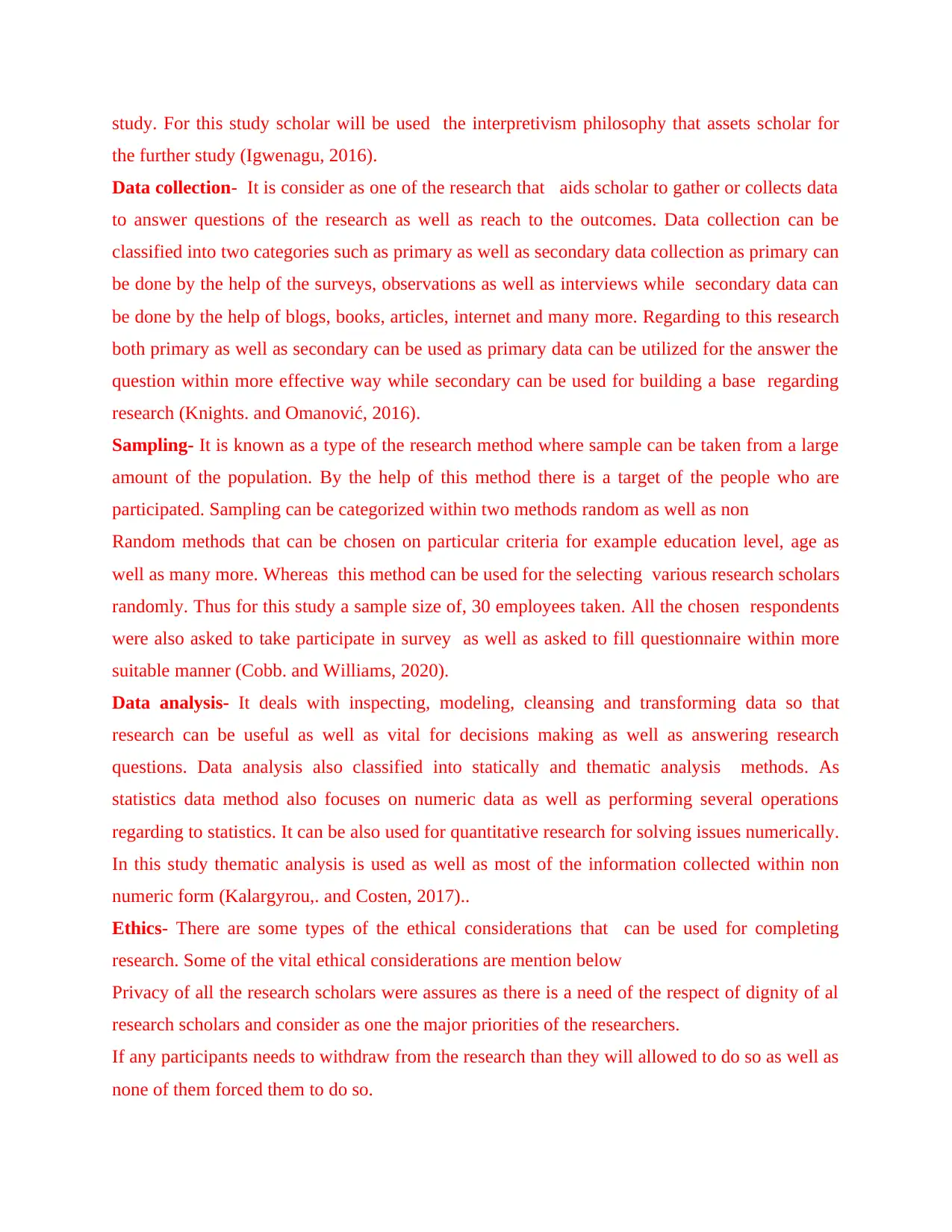
study. For this study scholar will be used the interpretivism philosophy that assets scholar for
the further study (Igwenagu, 2016).
Data collection- It is consider as one of the research that aids scholar to gather or collects data
to answer questions of the research as well as reach to the outcomes. Data collection can be
classified into two categories such as primary as well as secondary data collection as primary can
be done by the help of the surveys, observations as well as interviews while secondary data can
be done by the help of blogs, books, articles, internet and many more. Regarding to this research
both primary as well as secondary can be used as primary data can be utilized for the answer the
question within more effective way while secondary can be used for building a base regarding
research (Knights. and Omanović, 2016).
Sampling- It is known as a type of the research method where sample can be taken from a large
amount of the population. By the help of this method there is a target of the people who are
participated. Sampling can be categorized within two methods random as well as non
Random methods that can be chosen on particular criteria for example education level, age as
well as many more. Whereas this method can be used for the selecting various research scholars
randomly. Thus for this study a sample size of, 30 employees taken. All the chosen respondents
were also asked to take participate in survey as well as asked to fill questionnaire within more
suitable manner (Cobb. and Williams, 2020).
Data analysis- It deals with inspecting, modeling, cleansing and transforming data so that
research can be useful as well as vital for decisions making as well as answering research
questions. Data analysis also classified into statically and thematic analysis methods. As
statistics data method also focuses on numeric data as well as performing several operations
regarding to statistics. It can be also used for quantitative research for solving issues numerically.
In this study thematic analysis is used as well as most of the information collected within non
numeric form (Kalargyrou,. and Costen, 2017)..
Ethics- There are some types of the ethical considerations that can be used for completing
research. Some of the vital ethical considerations are mention below
Privacy of all the research scholars were assures as there is a need of the respect of dignity of al
research scholars and consider as one the major priorities of the researchers.
If any participants needs to withdraw from the research than they will allowed to do so as well as
none of them forced them to do so.
the further study (Igwenagu, 2016).
Data collection- It is consider as one of the research that aids scholar to gather or collects data
to answer questions of the research as well as reach to the outcomes. Data collection can be
classified into two categories such as primary as well as secondary data collection as primary can
be done by the help of the surveys, observations as well as interviews while secondary data can
be done by the help of blogs, books, articles, internet and many more. Regarding to this research
both primary as well as secondary can be used as primary data can be utilized for the answer the
question within more effective way while secondary can be used for building a base regarding
research (Knights. and Omanović, 2016).
Sampling- It is known as a type of the research method where sample can be taken from a large
amount of the population. By the help of this method there is a target of the people who are
participated. Sampling can be categorized within two methods random as well as non
Random methods that can be chosen on particular criteria for example education level, age as
well as many more. Whereas this method can be used for the selecting various research scholars
randomly. Thus for this study a sample size of, 30 employees taken. All the chosen respondents
were also asked to take participate in survey as well as asked to fill questionnaire within more
suitable manner (Cobb. and Williams, 2020).
Data analysis- It deals with inspecting, modeling, cleansing and transforming data so that
research can be useful as well as vital for decisions making as well as answering research
questions. Data analysis also classified into statically and thematic analysis methods. As
statistics data method also focuses on numeric data as well as performing several operations
regarding to statistics. It can be also used for quantitative research for solving issues numerically.
In this study thematic analysis is used as well as most of the information collected within non
numeric form (Kalargyrou,. and Costen, 2017)..
Ethics- There are some types of the ethical considerations that can be used for completing
research. Some of the vital ethical considerations are mention below
Privacy of all the research scholars were assures as there is a need of the respect of dignity of al
research scholars and consider as one the major priorities of the researchers.
If any participants needs to withdraw from the research than they will allowed to do so as well as
none of them forced them to do so.
⊘ This is a preview!⊘
Do you want full access?
Subscribe today to unlock all pages.

Trusted by 1+ million students worldwide
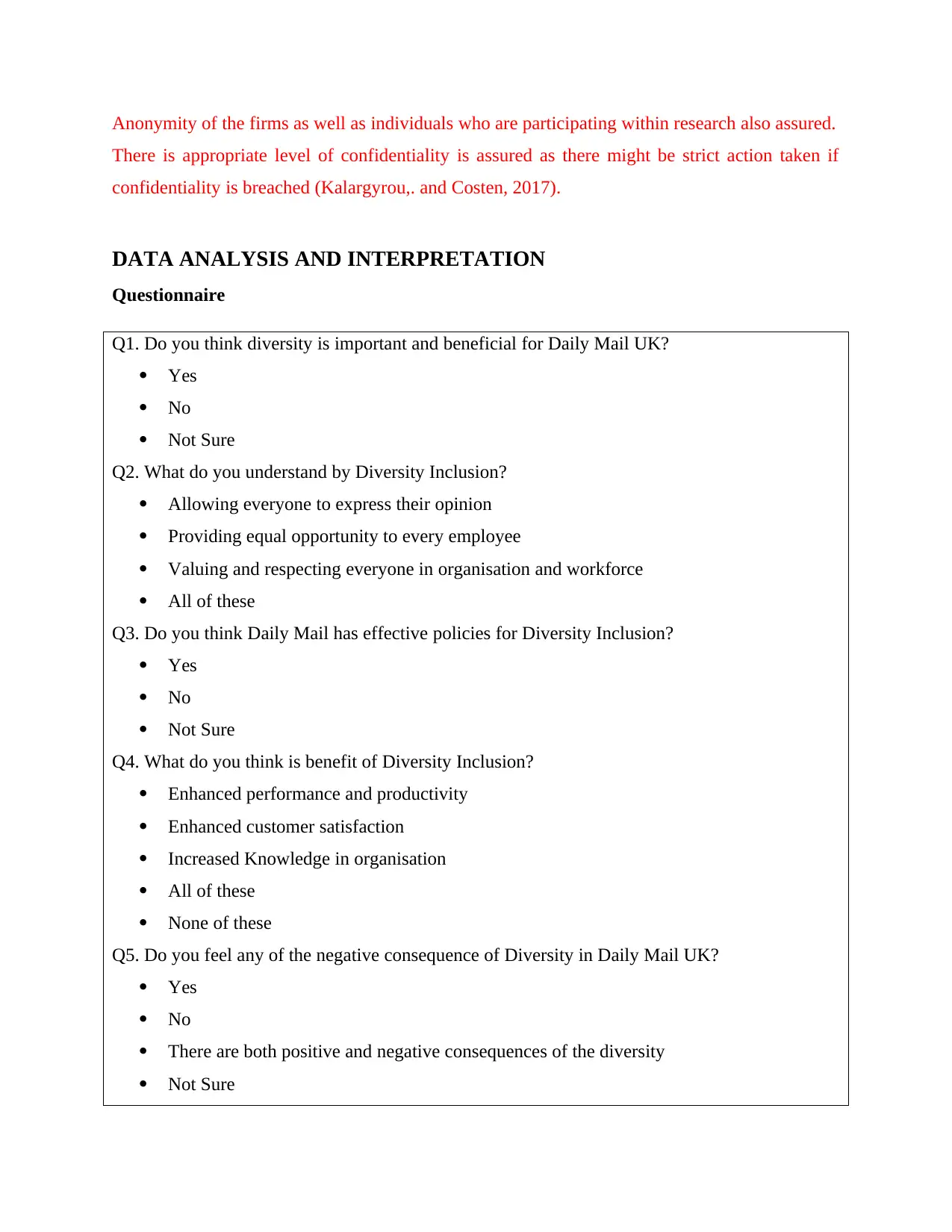
Anonymity of the firms as well as individuals who are participating within research also assured.
There is appropriate level of confidentiality is assured as there might be strict action taken if
confidentiality is breached (Kalargyrou,. and Costen, 2017).
DATA ANALYSIS AND INTERPRETATION
Questionnaire
Q1. Do you think diversity is important and beneficial for Daily Mail UK?
Yes
No
Not Sure
Q2. What do you understand by Diversity Inclusion?
Allowing everyone to express their opinion
Providing equal opportunity to every employee
Valuing and respecting everyone in organisation and workforce
All of these
Q3. Do you think Daily Mail has effective policies for Diversity Inclusion?
Yes
No
Not Sure
Q4. What do you think is benefit of Diversity Inclusion?
Enhanced performance and productivity
Enhanced customer satisfaction
Increased Knowledge in organisation
All of these
None of these
Q5. Do you feel any of the negative consequence of Diversity in Daily Mail UK?
Yes
No
There are both positive and negative consequences of the diversity
Not Sure
There is appropriate level of confidentiality is assured as there might be strict action taken if
confidentiality is breached (Kalargyrou,. and Costen, 2017).
DATA ANALYSIS AND INTERPRETATION
Questionnaire
Q1. Do you think diversity is important and beneficial for Daily Mail UK?
Yes
No
Not Sure
Q2. What do you understand by Diversity Inclusion?
Allowing everyone to express their opinion
Providing equal opportunity to every employee
Valuing and respecting everyone in organisation and workforce
All of these
Q3. Do you think Daily Mail has effective policies for Diversity Inclusion?
Yes
No
Not Sure
Q4. What do you think is benefit of Diversity Inclusion?
Enhanced performance and productivity
Enhanced customer satisfaction
Increased Knowledge in organisation
All of these
None of these
Q5. Do you feel any of the negative consequence of Diversity in Daily Mail UK?
Yes
No
There are both positive and negative consequences of the diversity
Not Sure
Paraphrase This Document
Need a fresh take? Get an instant paraphrase of this document with our AI Paraphraser
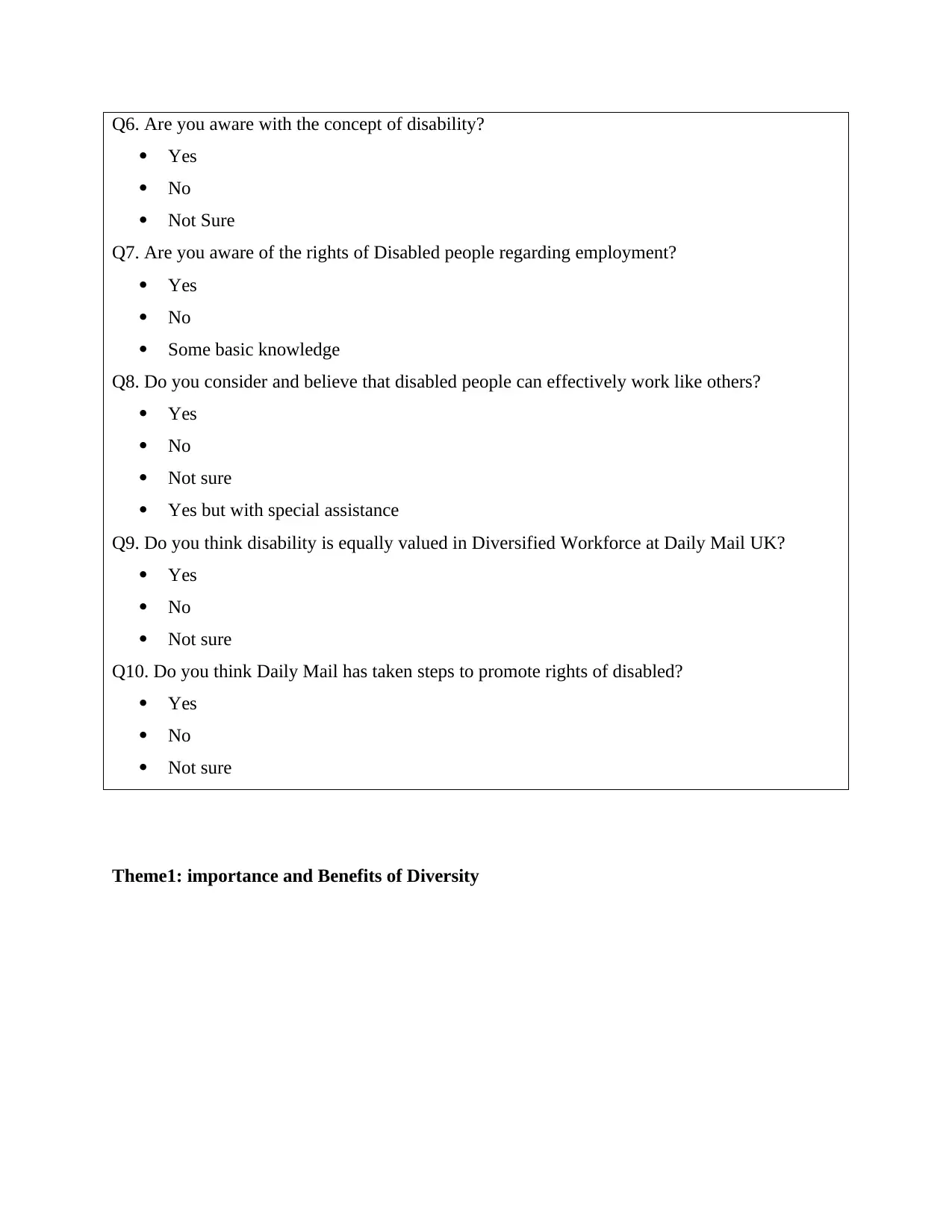
Q6. Are you aware with the concept of disability?
Yes
No
Not Sure
Q7. Are you aware of the rights of Disabled people regarding employment?
Yes
No
Some basic knowledge
Q8. Do you consider and believe that disabled people can effectively work like others?
Yes
No
Not sure
Yes but with special assistance
Q9. Do you think disability is equally valued in Diversified Workforce at Daily Mail UK?
Yes
No
Not sure
Q10. Do you think Daily Mail has taken steps to promote rights of disabled?
Yes
No
Not sure
Theme1: importance and Benefits of Diversity
Yes
No
Not Sure
Q7. Are you aware of the rights of Disabled people regarding employment?
Yes
No
Some basic knowledge
Q8. Do you consider and believe that disabled people can effectively work like others?
Yes
No
Not sure
Yes but with special assistance
Q9. Do you think disability is equally valued in Diversified Workforce at Daily Mail UK?
Yes
No
Not sure
Q10. Do you think Daily Mail has taken steps to promote rights of disabled?
Yes
No
Not sure
Theme1: importance and Benefits of Diversity
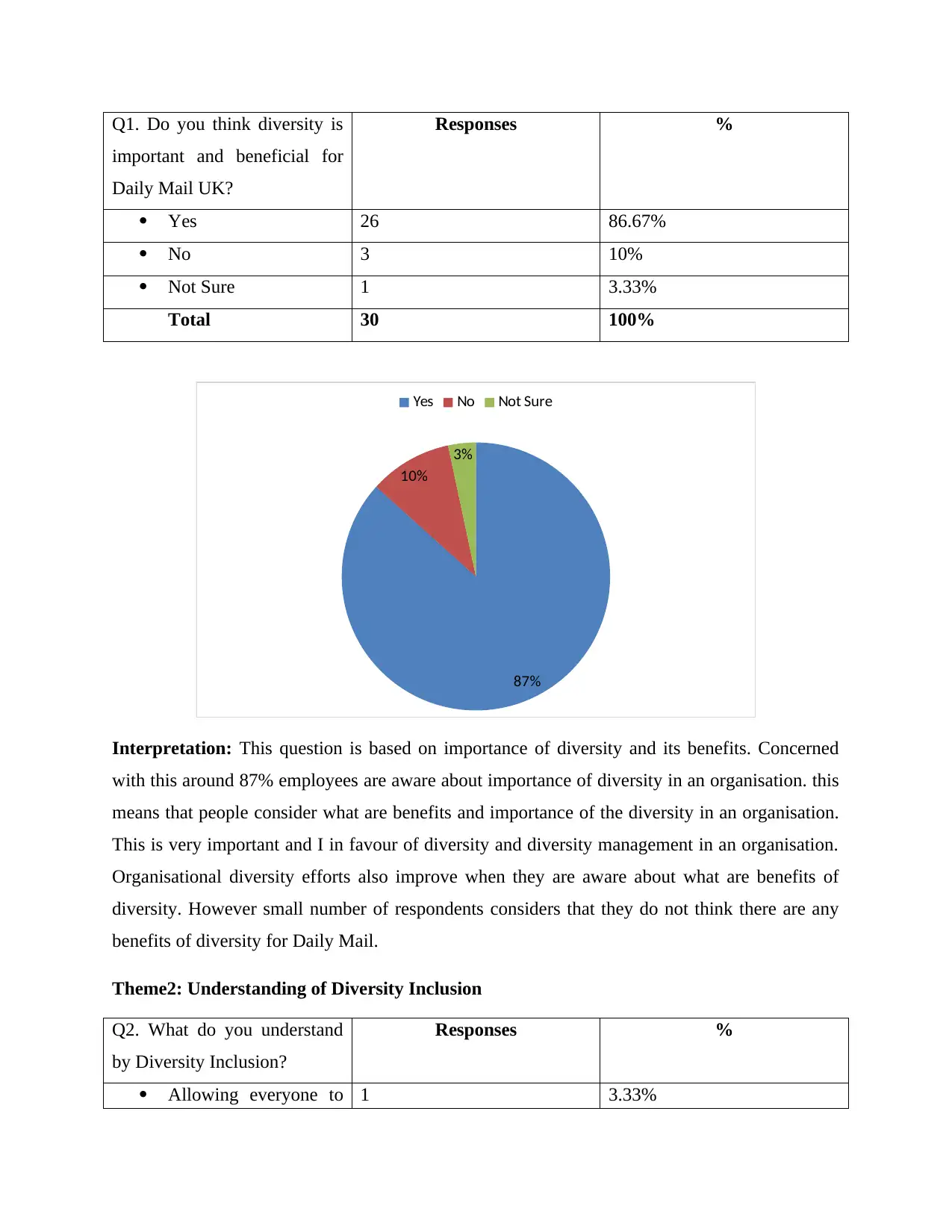
Q1. Do you think diversity is
important and beneficial for
Daily Mail UK?
Responses %
Yes 26 86.67%
No 3 10%
Not Sure 1 3.33%
Total 30 100%
87%
10%
3%
Yes No Not Sure
Interpretation: This question is based on importance of diversity and its benefits. Concerned
with this around 87% employees are aware about importance of diversity in an organisation. this
means that people consider what are benefits and importance of the diversity in an organisation.
This is very important and I in favour of diversity and diversity management in an organisation.
Organisational diversity efforts also improve when they are aware about what are benefits of
diversity. However small number of respondents considers that they do not think there are any
benefits of diversity for Daily Mail.
Theme2: Understanding of Diversity Inclusion
Q2. What do you understand
by Diversity Inclusion?
Responses %
Allowing everyone to 1 3.33%
important and beneficial for
Daily Mail UK?
Responses %
Yes 26 86.67%
No 3 10%
Not Sure 1 3.33%
Total 30 100%
87%
10%
3%
Yes No Not Sure
Interpretation: This question is based on importance of diversity and its benefits. Concerned
with this around 87% employees are aware about importance of diversity in an organisation. this
means that people consider what are benefits and importance of the diversity in an organisation.
This is very important and I in favour of diversity and diversity management in an organisation.
Organisational diversity efforts also improve when they are aware about what are benefits of
diversity. However small number of respondents considers that they do not think there are any
benefits of diversity for Daily Mail.
Theme2: Understanding of Diversity Inclusion
Q2. What do you understand
by Diversity Inclusion?
Responses %
Allowing everyone to 1 3.33%
⊘ This is a preview!⊘
Do you want full access?
Subscribe today to unlock all pages.

Trusted by 1+ million students worldwide
1 out of 27
Related Documents
Your All-in-One AI-Powered Toolkit for Academic Success.
+13062052269
info@desklib.com
Available 24*7 on WhatsApp / Email
![[object Object]](/_next/static/media/star-bottom.7253800d.svg)
Unlock your academic potential
Copyright © 2020–2026 A2Z Services. All Rights Reserved. Developed and managed by ZUCOL.





